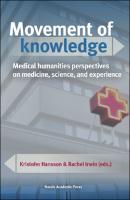Movement of knowledge
Medical humanities perspectives on medicine, science, and experience
Contributor(s)
Hansson, Kristofer (editor)
Irwin, Rachel (editor)
Language
EnglishAbstract
Medical knowledge is always in motion. It moves from the lab to the office, from a press release to a patient, from an academic journal to a civil servant’s desk and then on to a policymaker. Knowledge is deconstructed, reconstructed, and transformed as it moves. The dynamic, ever-evolving nature of medical knowledge has given rise to different concepts to explain it: diffusion, translation, circulation, transit, co-production. At the same time, its movements—and the ways in which we conceptualize and describe them—have material consequences. For instance, value judgements on the validity of certain forms of knowledge determine the direction of clinical research. Policy decisions are taken in relation to existing knowledge. The acceptance or rejection of treatment protocols based on medical ‘facts’ impacts on patients, dependents, health providers, and society at large. Simply put, knowledge and the movement of knowledge matter. How do they matter, though? The contributors to this volume examine the complexity of medical knowledge in everyday life. We demonstrate not only the pervasive influence of knowledge in medical and public health settings, but also the range of methodological and theoretical tools to study knowledge. Ours is a multidisciplinary approach to the medical humanities, presenting both contemporary and historical perspectives in order to explore the borderlands between expertise and common knowledge.
Keywords
Knowledge; Ethnography; Medicine; Health care Public health; ScienceDOI
10.21525/kriterium.24Publisher
KriteriumPublication date and place
Gothenburg, 2020Classification
Anthropology
The arts: general topics
Social and cultural anthropology
History of medicine
Medical and healthcare law
Children’s / Teenage general interest: Science and technology


 Download
Download